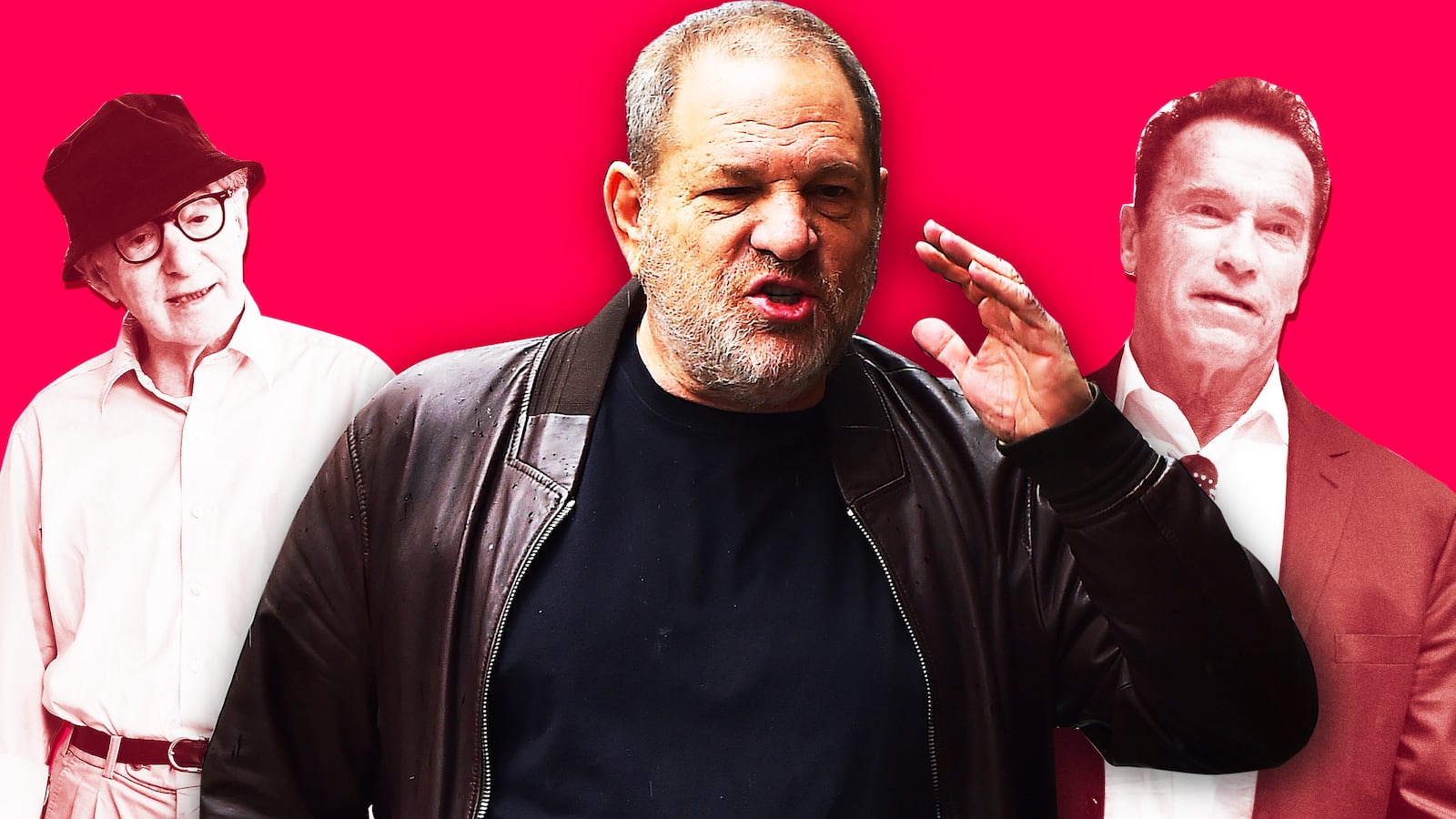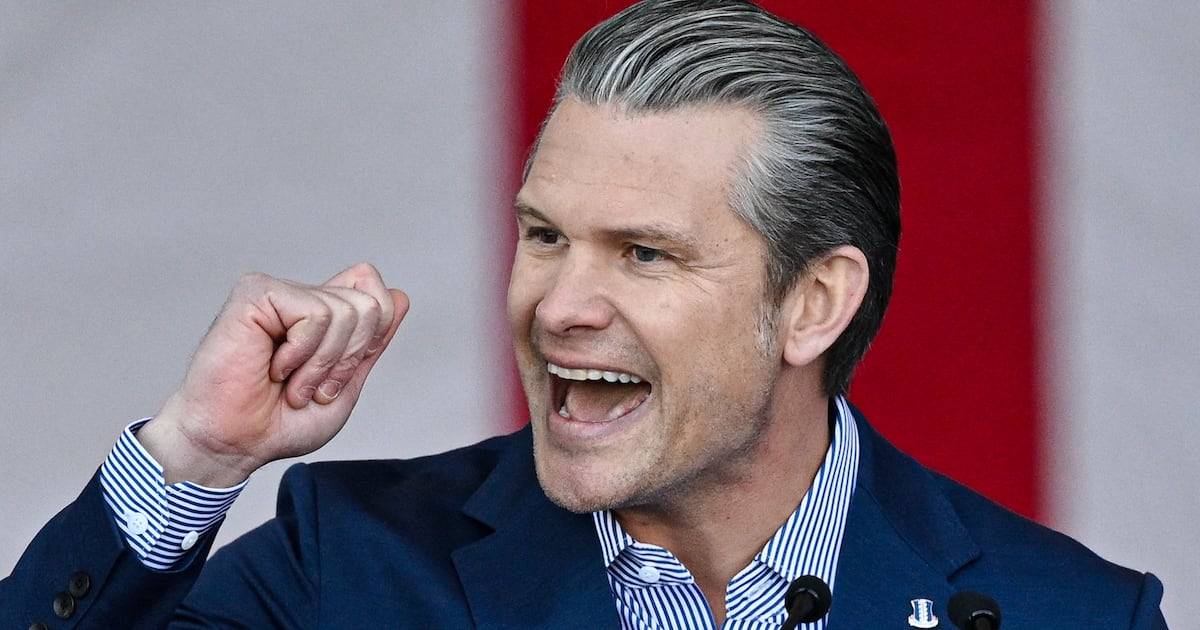On Sunday evening, The Weinstein Company’s board of directors reached the conclusion that “in light of new information about misconduct by Harvey Weinstein that has emerged in the past few days… his employment with The Weinstein Company is terminated, effective immediately.”
The damage, however, was already done. Weinstein, a terribly bullying, terribly pinguid, terribly influential movie mogul—first with Miramax, then Weinstein Co.—had allegedly committed heinous acts of sexual coercion and harassment for decades, with a bombshell New York Times investigation revealing that the 65-year-old exec paid off at least eight of his accusers, many of whom shared similar horror stories: a “business meeting” at a hotel suite soon gave way to propositions that were increasingly sexual in nature. One TV reporter claimed that Weinstein cornered her in the bowels of his restaurant before jacking off into a potted plant. His accusers say they felt trapped, pressured to give in to this round mound of renown’s base demands. He was, after all, a Hollywood kingmaker; the man behind modern cinema classics like Pulp Fiction, The Lord of the Rings, and Good Will Hunting; a behind-the-scenes wizard who’d been thanked at the Academy Awards more often than God. How could they deny him?
Weinstein’s comeuppance had a ring of poetic justice to it—after all, the Times piece dropped around the one-year anniversary of Donald Trump’s infamous “grab them by the pussy” Access Hollywood tape, in which the president-to-be was caught on a hot mic bragging that his stardom allowed him to sexually assault women at will (both Weinstein and Trump are from the outer borough of Queens). It was also curious how, the very same week, Politico chose to run (and incessantly tweet out) a glowing profile of celebrity-turned-politician Arnold Schwarzenegger, a man who stands accused of predatory behavior similar to Weinstein and Trump.
Right now, many people—both in the Tinseltown bubble and beyond—are asking why? Why now, after decades of payouts and whispers, did one of cinema’s most powerful players finally get his? It’s a difficult question to fully answer, though one possible reason is an increased sense of media accountability surrounding the issue of sexual misconduct in Hollywood, born out of the Bill Cosby case and having more women’s voices heard in newsrooms.
When the full scope of the Cosby catastrophe came into focus, that one of America’s most “beloved,” “wholesome” comedians stood accused of sexually assaulting more than 60 women over a 40-year period, everyone in the access-reliant entertainment media should have received a much-needed wake-up call. They were, in a sense, complicit, churning out profile after pasteurized profile that helped fuel the Cosby mythos. Even right as the horrifying Cosby testimonies were coming to light, former Newsweek editor Mark Whitaker was peddling a 544-page biography of the funnyman scrubbed of any rape allegations.

Taylor Swift, Este Haim, Jaime King, Harvey Weinstein and Lorde attend The Weinstein Company's 2015 Golden Globes After Party on January 11, 2015 in Beverly Hills, California.
Angela Weiss/GettyWeinstein was even more well-connected in the New York media landscape than Cosby, with numerous friends in very high places. He’d infamously launched Talk magazine with Tina Brown (also the founding editor of The Daily Beast), and seemingly, between the ad dollars he spent and the access he could no doubt provide (or withhold), had the cachet to get stories killed.
In the wake of the Times exposé, Page Six ran a story maintaining that New York magazine had its own Harvey Weinstein blockbuster locked and loaded a year ago, but it disappeared after a meeting between the power broker and the publication’s editor in chief, Adam Moss (New York denies this). Sharon Waxman penned a piece over at The Wrap about how, back in 2004 while reporting for The New York Times, she was looking into allegations of sexual misconduct against Weinstein when the story was spiked—by her male editor—following “intense pressure from Weinstein,” which included a newsroom visit, and replaced by an anodyne slice of studio agitprop. Weinstein even got away with dragging a New York Observer reporter around in a headlock on a New York City street in front of reporters, photographers, and revelers, according to The Cut’s Rebecca Traister, who says she witnessed the episode firsthand. The New York Times’ account of the melee places all the blame on the reporter, while then-Page Six scribe Paula Froelich tweeted that she was going to run a more accurate account of it in her column… until Miramax stepped in and effectively took the reins.
The Times’ recent Weinstein story, meanwhile, came about thanks to two intrepid female reporters, Jodi Kantor and Megan Twohey, operating at an organization whose news masthead is comprised of 50 percent women, and one “name” actress in Ashley Judd, who was mad as hell and not going to take it anymore.
It’s not just the media that enabled Weinstein, either. Since the sexual-misconduct allegations came to light, those who have benefited from professional relationships with the embattled film mogul, from directors and actors he launched to stardom to agents and producers who got their cut, have remained deafeningly silent. The Daily Beast has reached out to dozens of industry folks, and the consensus is it’s the talk of the town behind closed doors, but no one is willing to go on the record—perhaps fearing that it could hurt them down the line, should Weinstein return from the dead. Even late-night TV hosts, who relish assuming the role of moral arbiter, have—with the notable exception of Last Week Tonight’s John Oliver—thus far refused to violate the apparent omertà.
Worth noting, too, is that Weinstein’s star has diminished considerably in recent years. His company is coming off a string of duds, including the much-ridiculed Tulip Fever, and the last Weinstein-shepherded Academy Award came over two years ago in a minor category (Best Adapted Screenplay for The Imitation Game). As with Cosby, retribution for Weinstein did not come until he was past his sell-by date.

Arnold Schwarzenegger attends the 'Wonder Of The Sea 3D' premiere on September 25, 2017 in San Sebastian, Spain.
Carlos Alvarez/GettyWhich brings us back to Schwarzenegger, and that profile of him that ran over the weekend in Politico. In the piece, the writer, Edward-Isaac Dovere, confesses to having accompanied Schwarzenegger on flights aboard his private jet and red-wine-filled feasts in Spain, and in return, gifted his idol with a puffy piece wherein he floated the actor for a number of Cabinet positions and refused to press him on his pitiable track record as governor or myriad sex scandals—including, as it were, numerous Weinstein-esque allegations of sexual misconduct.
A 2001 piece in Premiere magazine is largely credited with lifting the lid off the Schwarzenegger allegations. In the story, titled “Arnold the Barbarian,” writer John Connolly uncovered numerous shocking stories concerning the actor, from a female talk-show host who claimed that he “tweaked her nipple and then laughed at her objections” to a producer who recalled how, on the set of Terminator 2: Judgment Day, Schwarzenegger allegedly pulled out a female crew member’s breasts against her will. “I couldn’t believe what I was seeing. This woman’s nipples were exposed, and here’s Arnold and a few of his clones laughing. I went after the woman, who had run to the shelter of a nearby trailer. She was hysterical but refused to press charges for fear of losing her job. It was disgusting,” the producer told Premiere. Two years later, just as the A-list actor emerged as the Republican frontrunner in the race for governor of California, the Los Angeles Times ran a series of stories in which as many as 11 women accused Schwarzenegger of grabbing or groping them, including an assistant director on the 1988 film Twins and a CNN intern.
“Did he rape me? No,” one unnamed woman, who alleged the actor grabbed her breast in 1980, told the Los Angeles Times. “Did he humiliate me? You bet he did.”
Schwarzenegger initially denied the allegations through his spokesman, before sort of fessing up. “It is true that I was on rowdy movie sets and I have done things that were not right, which I thought then was playful,” he said at the time. “But now I recognize that I offended people. Those people that I have offended, I want to say to them I am deeply sorry about that and I apologize because that’s not what I’m trying to do.”
This selective outrage also extends to Woody Allen, whose latest feature Wonder Wheel is closing the New York Film Festival this week. The film’s marquee stars, Kate Winslet and Justin Timberlake, are two of many who continue to feature in Allen productions—despite the fact that the legendary filmmaker’s own adopted daughter, Dylan Farrow, has long accused him of child sexual abuse. Or how about Louis C.K., whose Allen-inspired film I Love You, Daddy opens on Nov. 17, and who’s been dogged by sexual-misconduct rumors for years?
When it comes to Hollywood, these men, it seems, have not yet outlasted their use.






